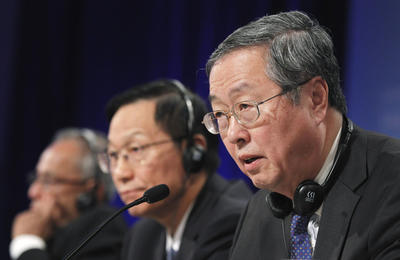Second, the US dollar is the cornerstone of the international monetary system. Third, three international organisations — the International Monetary Fund (IMF), World Bank (WB) and World Trade Organization (WTO) — are responsible for maintaining order in the international economy.
For more than half a century this system facilitated steady growth of the global economy. But recently there are growing calls for reform. Two important events have strengthened these demands. The first is the ascendancy of emerging market economies, with calls for some emerging economies to move to the centre stage of international economic decision-making. The second is the subprime crisis in the US, which raised serious questions about the future international roles of the US and its dollar.
China is likely to play an important part in the transformation of the international economic system. It is already the second-largest economy in the world according to market-based GDP measures and may overtake the US as early as 2013 according to the purchasing power parity-based GDP measures. China’s international economic influences have grown exponentially, especially in international markets for labour-intensive manufactured goods, raw materials and commodities and foreign exchange.
Given the significant role it is likely to play in the process, a key question for reforming the international economic system is: what does China want?
First, China wants reform, not revolution, of the international economic system. It recognises that the world has become a multi-polar system, with a number of large economies possessing significant influence on the world economy. China shares many of the economic values of these nations, including those that relate to free trade and investment, and is keenly interested in working with the other major countries in building a ‘harmonious world’. While some existing rules are in urgent need of reform, China wants to improve the existing international economic system, not abandon it.
China sees the G20 as the best compromise between representativeness and efficiency for dealing with international economic issues and is interested in making it a permanent institution. The Sino–US partnership will remain a cornerstone for China’s international economic relations, but China is not ready to formalise the institutional arrangement of a Group of Two (G2) for global economic affairs. China promotes collaboration among the BRICs countries (Brazil, Russia, India and China) but regards the association more as a platform for formulating policy positions among key emerging market economies, not as a parallel organisation alongside the G20.
China is in favour of any restructuring initiatives that give more influence to emerging market economies within international organisations such as the IMF and the World Bank. While these organisations have made important contributions to China’s economic reforms, their governance and rules should be reformed to better reflect the new reality of the world economy. IMF reforms, for instance, should allocate more voting shares to developing countries, give up the practice of appointing Europeans to its managing directorship, abandon the US veto power and set policies more appropriate for emerging market economies.
China supports reforms of the international monetary system but sees avoiding the sudden collapse of the US dollar as critical. The transition of the global reserve system is likely to be a long-term process. China, the US and the other major economies of the world should work together to ensure a smooth transition of the role of the dollar, which is critical for providing a stable global economic environment. China also wishes to internationalise the renminbi (RMB), which could eventually become part of a multi-reserve system.
If China wants to see other countries cooperate in making these desires a reality, it will have to acknowledge and follow through on its own responsibilities. For example, as the world’s second largest economy, China needs to abandon its small-country mentality. Economic decisions by any large countries should take into account the possible effects on, and reactions of, other countries.
China must also promote further liberalisation of its own economy and move closer to a market economy, including reforms of its exchange rate regime, capital account controls and distortions in other factor markets. At the same time, China should also promote private sector development and contain the influence of the state sector, especially in international economic areas. This is critical for supporting an open and efficient international economic system.
Finally, it is time for China to learn to work with the US and other G20 members to provide public goods services for the world economy. In line with China and the other emerging economies asking for more rights, they should also share more of the responsibility in maintaining a stable global economic environment, enforcing the international economic rules and assisting countries temporarily struck by adverse economic shocks.
Yiping Huang is Professor of Economics, Peking University, and in the China Economy Program, The Australian National University. He is currently Chief Economist for Asia for Barclays Bank, based in Hong Kong.
This article appeared in the most recent edition of the East Asia Forum Quarterly, ‘Asia’s global impact‘.

